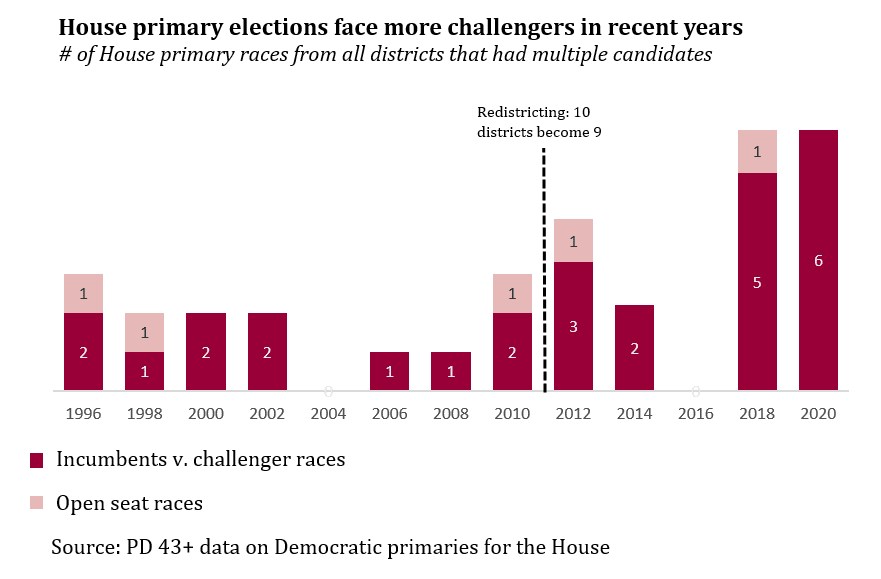The Topline: Wait Wait, Don’t Primary Me
2018 saw the most contested Democratic primaries for the House in decades; will 2020 top it?

It used to be both polite and practical to wait your turn to run for Congress in Massachusetts. Party leaders and insiders frowned on impertinence, and the very occasional primary challenges that happened were rarely successful. That era is ending. We’ve seen two longtime incumbents unseated in the last few cycles, and the 2020 congressional primary season could be the most competitive since at least 1970.
Six of the state’s nine House seats already have multiple candidates (the 1st, 2nd, 4th, 5th, 6th, and 8th districts all have declared challengers. If all of the current challengers continue through to Election Day, this cycle will tie with 2018 for the highest proportion of seats with a primary challenger in Massachusetts dating back to 1970, according to state records.
That may not be all. Norwell Selectman and former Marty Walsh advisor Joe Rull said publicly he’s considering a run for Bill Keating’s 9th district seat. And Walsh’s former chief of staff Dan Koh may return to challenge Lori Trahan in the 3rd, after she narrowly defeated him in the 10 way scrum of 2018. Should either of these candidates declare, 2020 will be at least a 50-year record for the most competitive Democratic primary season in decades. Either way, it appears likely 2018 and 2020 will be the most competitive cycles in decades, signifying a change to the long established rules of the road. Whether it proves permanent or not, the change has been sudden. Even as recently as 2016, not a single member of the delegation faced a primary challenge. Credit the energy brought about by Trump’s election which galvanized a new and more diverse generation of candidates all across the country.
Whether it proves permanent or not, the change has been sudden. Even as recently as 2016, not a single member of the delegation faced a primary challenge. Credit the energy brought about by Trump’s election which galvanized a new and more diverse generation of candidates all across the country.
And challenges beget more challenges. Waiting your turn is less appealing if others don’t wait theirs. Instead, patience may be rewarded by watching the seat into someone else’s hands who jumped the line to mount a challenge. This is not theoretical, as those who chided now Rep. Ayanna Pressley for her audacity to challenge Michael Capuano in the 7th district now find themselves on the outside looking in. Challenging an incumbent also offers a smaller field of candidates, where waiting for an open seat before running raises the prospect of competing in a crowded field.
As most of the delegation’s House members look over their shoulders at an army of candidates swarming toward them, one seems done waiting his turn and is looking to mount a primary challenge of his own. Rep. Joe Kennedy III all but confirmed he will take on Sen. Ed Markey in the Democratic primary in a Facebook post this week. After a mysterious poll seemed to be testing such a matchup, the post and a brand new “Kennedy for Senate” campaign committee filing with the Federal Elections Commission confirmed the rumors.
In his post, Kennedy offered a nod to the wait-your-turn crowd, writing “I hear the folks who say I should wait my turn, but with due respect — I’m not sure this is a moment for waiting.” Kennedy’s words echo ideas behind the swell of primary challengers that have risen up over the last few cycles, who identify generational differences as a reason to run rather than a reason to wait. To wit, Rep. Ayanna Pressley’s campaign slogan was “Change Can’t Wait.” Seth Moulton unseated longtime Rep. John Tierney in 2014 and has elevated not waiting his turn to an art form.
Waiting for an open seat has also gotten old, as have potential candidates who have done it. Democrats have held every House seat in the delegation since 1997. Since that time, there have been just seven open seats. The Senate has recently seen more turnover, but Edward Kennedy and John Kerry held the seats for decades before that. Even in the state legislature, competition has been scarce, with Massachusetts boasting the least competitive legislative elections in the country. For the most part, reelection at all levels in Massachusetts has been all but a formality. But with a host of new challengers refusing to get in line, those days are gone.





